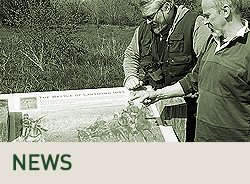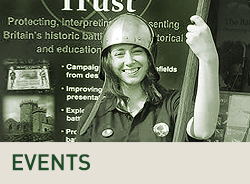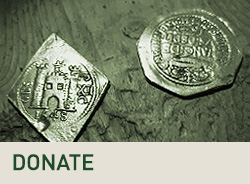Paschall's account
Paschall’s two accounts of the battle as integrated in the English Heritage report, with the material from the later version identified in italics:
‘Upon Sunday, July 5, the King's army, consisting of about 4000 men, marched from Somerton. About noon they encamped in Zog, in five regiments, lodge in the camp; 500 horse quarter in Weston; 1500 militia men took up their quarters in Middlesoy, Othery etc, a mile or two distant from Weston ... That evening, between nine and ten of the clock, the Duke leads his army out of Bridgwater with great silence. He did not take the nearest way to Weston, which was three miles in length, by which he went June 22, and returned July 2, but he took the long causey, and so made his march near three miles long before he could reach the King's camp. He left the way by that short causey though Chedsey, though that was nearer and much more commodious, probably to avoid the danger of being discovered ... Avoiding them [the inhabitants], therefore, who knew, generally, nothing of his march, he went by Bradney Lane; which lane he also soon left, probably that he might not come too near to a loyal man's house at the end of that lane, where it turns into the moor, so by Marsh Lane, which was further about, and less commodious, he led the army much incumbered, and retarded, by the narrowness of the lanes into the North Moor.’
‘.... About sunset, a party of the King's Horse came to Langmoor Stone from the Camp and taking with them the Guard there (about 12 or 16 horse) went by North Moor into Bawdrip and afterward up the hill towards [the] Bristol road. They passed by Long Cawsey to Bridgwater town's end and so round the next way to Weston. While they were about Bawdrip, the Duke's army marched into North Moor with great silence, standing still till the Guard party of horse was gone for they were within view of them. This party is supposed to be Col. Oglethorpe's.
About midnight (probably while the Duke of Monmouth was in North Moor) another party of the King's horse came from Zog by Langmoor Stone and step stones to Parchey Gate, so they marched quite through Chedzoy and round, as is supposed, to the Camp again, yet though they were so near to the enemy marching towards the King's army, those horse made no discovery of them. Guards and sentinels were placed in all the avenues in and about the nearer way from Weston to Bridgwater and in the other and farther way about by which the enemy designed to come. But all were gone (particularly that most necessary Guard at Langmoor Stone and the sentinels that stood near it) before bedtime ... Countrymen, hearing that the Duke was moving, informed divers of the officers and of the King's soldiers of it. JW [John Whiting, a local Quaker] avers that he himself spoke of it to above 500 of them but none would believe it
Only Captain Mackintosh, in the Scots regiment, believed over night, and would have ventured wagers upon it, that the Duke would come. He, in that persuasion, marked out the ground between the tents and the ditch, where his men should stand in case of an attack, and gave directions that all should be in readiness; and it was well he did so; for his regiment being in the right wing was to receive the first assault and main shock...
To return to the Duke's army which we left in North Moor, they had placed 42 waggons in the ascent of Bulden Hill in Bristol road, with orders to drive on to Axbridge. They bring with them now three great guns, and march with great silence. The Lord Grey led the horse, supposed to be about 800. [Of these Monmouth] committed 500 horse to the Lord Grey with this design, that they should march about quarter of an hour before the main body of the army directly to the Upper Plungeon [a crossing of the Bussex Rhyne] and, in going over, they should silently get behind the camp, seize the officers in their beds, as also the 18 guns and 160 wagons standing all together and, if occasion were, turn the guns, as they might have done easily, upon the King's Camp and this gave them a terrible alarm on that side. The known ways being very convenient for doing all this. While this was to be in doing, the Duke, with the body of his army, was to make the onset. These were commanded to march with all possible silence. Their first orders were to fire and run over the ditch within which the camp was, it being presumed that the Lord Grey with his 500 horse should have drawn the army in the camp into the town, by the alarm designed to be given from thence. When all this was just putting into execution and the Duke's army was marching after midnight into Langmoor with great silence, a pistol was discharged about step stones or Langmoor Stone. Captain Hucker is said to have owned it at his trial, as done by him to give the King's army notice of their danger near. Immediately a trooper rides from that place‑ward full speed to the camp [and], standing on the outside of the ditch, calls with all imaginable earnestness, 20 times at least, 'Beat your drums, the enemy is come. For the Lord's sake, beat your drums'. He then rode back with the like speed the same way he came. Among some of the King's soldiers, particularly the Scots, there were expectations of the enemy before this, yet all continued quiet. Now the drums beat, the drummers running to it, even bare‑foot for haste. All fly to arms. All are drawn out of their tents and in 5 battalions stand in the space between the tents and the ditch, [those] fronting the ditch not having their clothes or arms all on and ready. Then were they expecting the enemy.
The Lord Grey, with his 500 horse, missed the Upper Plungeon. Falling before it, they marched on by the outside of the ditch, seeking a way over, which was not to be found for the horse, though the ditch was then dry enough for the foot to have got over. When [the] horse were come so far as the Scots battalions, they were demanded who they were for. They pretend they are friends and from the Duke of Albemarle. They are believed by the Scots and let pass. At length they are discovered and fired at and so march off. Those wheeling toward the rear of the Duke's army are fired at by their own with some execution, they supposing them to be the enemy coming from the left wing of the King's army. Thus a consternation went into the hinder part of the Duke's army which, by the narrowness of the lanes retarding them, were not come up. The Front also being somewhat sooner engaged than was intended by reason of the Alarm given. Sir Francis Compton stood with a guard at the upper Plungeon. One Jones was commanded with a party of horse to beat him from that passage. He played his part with so much valour, that for the same he was thought not unworthy of a pardon from the General. But Sir Francis, though hard beset and wounded yet kept his post so well that the rebels horse behind, said to be 300, went backward on the outside of the ditch toward Sutton Mill, near which they took up their station to see the issue of the fight. When it appeared how things went, they shifted for themselves. Whether Sir Francis were there before the 500 horse missing their way went down toward the camp, or came to the Plungeon afterwards, and so had his encounter with Jones as belonging to the latter 300 horse we do not know. To be sure that worthy gentleman did great service, for had the horse gone over there, notwithstanding the alarm, all might have been lost. It was not above half a quarter of an hour, the Duke having planted his three guns north of the King's Camp, before the foot continuing their march appear to the Scots, first in three bodies, then the third lesser body joins with one of the other two. Of these there were 2000 of their prime, and principally Taunton men, led by Wade. By these the fight was managed. The King's soldiers gave them the commendation of stout men, 2000 more, among whom were 1000 scythe men, stood at a distance between Lang Moor Stone and them. These 2000 came not to fight. Many are said to have been behind them who, being hindered by the lanes through which they marched could not come up, before they met cause to run with their fellows. The fight continued not above half an hour. It is said that victory seemed to be inclined to the rebels, and that the King's army was almost in despair. We are next to give an account of the following happy alteration.
...the 2000 foot which made the assault were first commanded to run over the ditch. This was as is likely, upon a presumption that the horse, going over the Plungeon, and so into Weston, would have given the alarm behind the King's camp. Accordingly they marched in[to] the Moor with a persuasion that the King's army was running. So Wade is said to have told his men they were; silence they would have broken, though commanded silence, and shouted, had not he, doubting their circumstances, restrained them. But when these foot were come to the ditch, things were found to be otherwise than they hoped, and they were commanded [on] pain of death not to go over. And this might easily put them into some confusion and consternation. The assault made was chiefly upon the Scots (of whom 'tis said that the Duke of Monmouth was made to believe that they were disposed to come over to him and this by a drummer who ran from them to him into Bridgwater the night before).
...At length the Scots (who had but four officers in their regiment of 500 men that were [not] killed or wounded) were made to give ground. They are seasonably reinforced by three troops of horse of the King's ... Things being thus, the immediate cause of the rout was this. Upon the alarm the King's horse, said to be 500 quartered in Weston, get up, made ready their horses, and mounted as soon as they may, and get together, and as is said, designing to go to the camp and fight, miss their way, and ride into Weston town, out of which they pass into the Moor by the road‑way leading to Bridgewater, and now they are in the outside of the ditch. By this time three of the King's guns are drawn from the place where they stood altogether, and planted on the inside of the ditch, between it and the tents. These, being fired, made lanes among the rebels, and at the same time with great courage and fury the King's horse break in upon them. This was presently followed with a total rout of the rebels, running every way, and leaving to the King's army an intire victory.’





